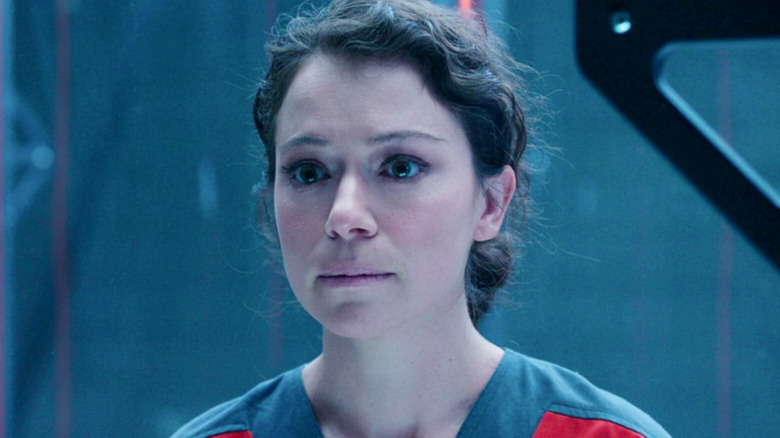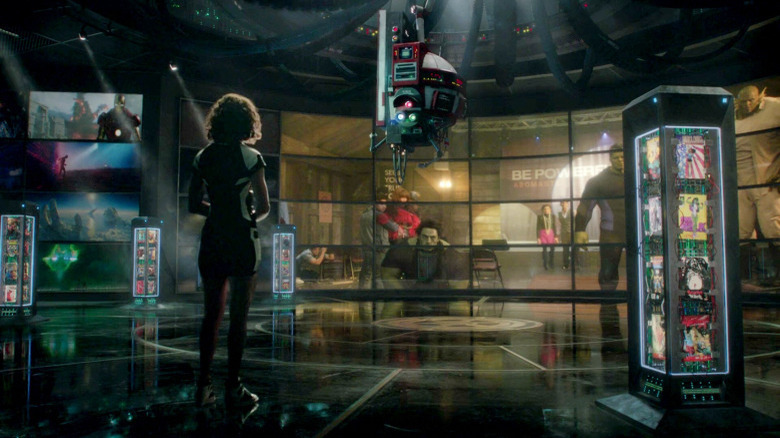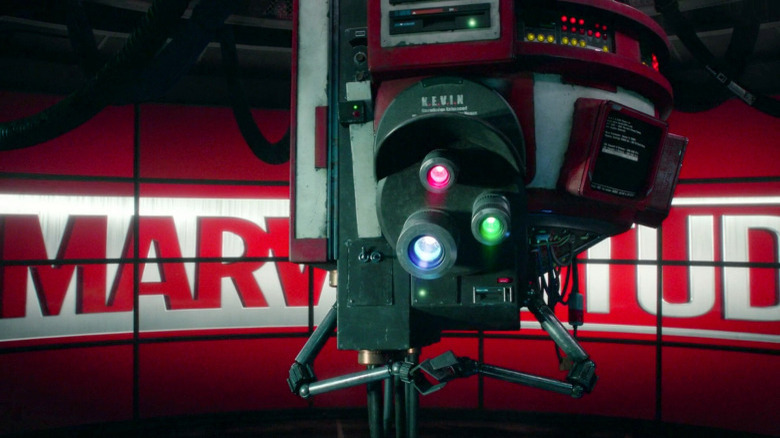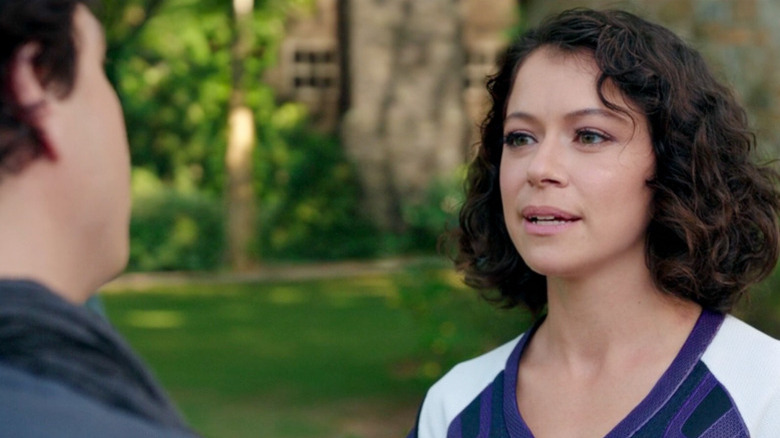The She-Hulk Finale Directly Confronts Every Little (And Big) Problem With The MCU
This post contains spoilers for the "She-Hulk" finale.
Over the course of its nine-episode season, "She-Hulk: Attorney at Law" has emerged as one of the highlights (if not the highlight) of Phase 4 of the Marvel Cinematic Universe. More than any other Disney+ MCU show this side of "WandaVision," creator Jessica Gao's meta-legal comedy series has effectively utilized the episodic format of its medium to serve its storytelling. No two episodes of "She-Hulk" feel the same, and I mean that in the best way possible.
But it's not just that. The first time Jennifer Walters (Tatiana Maslany, reminding everyone why we loved "Orphan Black") broke the fourth wall in the premiere's opening minutes, it mostly felt like the show's attempt to lampshade its own fidelity to the MCU formula. However, as things progressed, the series made good on its promise to change things up. It focused primarily on Jen's daily struggles to balance her dual lives, be it in the eyes of the media, at her workplace, or in her search for a decent date. Likewise, Jen's fourth wall breaks evolved into witty observations about the conventions of TV, the way social media shapes our modern pop culture, or merely the joys of — ahem — smashing Matt Murdock.
Heading into the season (series?) finale, the fear was "She-Hulk" would stumble and revert back to MCU formula like "WandaVision" eventually did, devolving into a display of CGI and actors being swung around in front of digital backdrops. Instead, the show gave us one of the finest visual gags of the streaming era — having Jen use the Disney+ homepage to escape her show and break into "the real world," bringing her face-to-face with not just the actual "She-Hulk" writers but the series' true final villain: Marvel Studios itself, and its many clichés.
Jen vs. KEVIN
The MCU, "She-Hulk" reveals, is overseen by an A.I. robot dubbed KEVIN, which is short for Knowledge Enhanced Visual Interconnectivity Nexus. Naturally, it's a cheeky joke about Marvel Studios head honcho Kevin Feige and the studio's assembly line approach to churning out films and series. But the obvious visual pun (e.g. the MCU is the handiwork of a literal machine) proves to be the first of several jabs at the recurring problems with the MCU, big and small.
Jen, you see, is frustrated. The "She-Hulk" finale has descended into one giant punch-fest, with every major character from the series miraculously showing up in the same place at the same time. That includes Todd Phelps (Jon Bass), who confirms he's "HulkKing" and the founder of Intelligencia. Upon injecting himself with some of Jen's blood, Todd transforms himself into a Hulk and the stage is set for a massive showdown. But what does any of this have to do with Jen spending all season learning to balance her lives as both herself and She-Hulk?
Such is the question Jen poses to KEVIN, though only after KEVIN requests she change from She-Hulk to Jen off-screen to lower the show's VFX costs in yet another joke at the MCU's expense. Once that's done, KEVIN claims it uses the "most advanced entertainment algorithm in the world" to produce films and series, insisting its formulas yield near-perfect if clichéd results. When Jen asserts "She-Hulk" is her show and, therefore, she ought to have final say over its creative direction, KEVIN disagrees, calling it "KEVIN's show." It's a witty bit that doubles as both a dig at Marvel Studios' well-known history of keeping its creatives on a tight leash and what feels like a nod to Gao sparring with Feige behind the scenes.
Talking things out
Putting her lawyerly skills to work ("Ooh, a payoff!" as Jen might say in one of her fourth wall breaks), Jen reasons to KEVIN that the MCU became popular thanks to its "big spectacles and high-stakes plotlines," yet is now under fire for relying too much on those same tired tropes. By doing this, she convinces KEVIN to keep the finale focused on the show's small stakes (namely, Jen's emotional well-being), while also working in a dig at the MCU's habit of featuring plot devices "suspiciously" similar to the Super Soldier Serum.
In fact, once KEVIN opens the floodgates and allows Jen to rework the show's finale as she deems fit, she can't help but take aim at everything from the MCU's bad dads to its lack of sex appeal for women ("Historically, we've been light in that department," KEVIN admits) and asking when, precisely, the X-Men are joining the fray. Thankfully, once she's finished venting, the revamped finale ends with a series of narratively satisfying moments in which the villains get their just desserts (minus all the punching and fireworks) and Jen is finally able to embrace both sides of who she is. It's a turn of events that allows "She-Hulk" to remain true to its ethos as a series, proving once again that communication, not fisticuffs, is the key to dealing with many of our day-to-day problems.
Marvel has its cake and eats it too
Now, is this the MCU having its cake and eating it too? Absolutely! The "She-Hulk" finale doesn't pull its punches so much as it avoids going for the knockout — be it calling out Marvel Studios for mistreating its VFX artists or the MCU's historically moderate to conservative politics. And much like when Disney mocks its oudated princess formula in animated films like "Ralph Breaks the Internet," you never really get the sense "She-Hulk" is going to go further in this respect than its bosses at the Mouse House are comfortable with. (See also: the lack of jokes about Disney and the MCU's poor track record when it comes to even featuring queer characters, much less affording them decent representation.)
At the end of the day, Marvel Studios and Disney are powerful corporations, enough so they can take the mickey (heh) out of themselves this way without actually risking anything in the process. But just like it's not on Jen to defeat sexism single-handedly, it's not on "She-Hulk" to find an easy solution for the MCU's problems, be they major or minor issues. All it has to do is tell the story it set out to tell, which it does. That it's able to do so while also cleverly confronting the ways it's limited by Marvel in its characteristically absurd, meta fashion is just the icing on the cake (to complete the analogy).
All episodes of "She-Hulk: Attorney at Law" are now streaming on Disney+.



